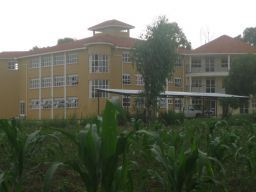Do you remember what life was like when smartphones didn’t exist?
How about Uber/Taxify cab services?
Or ordering your food online?
If we rewind back 4-5 years of our lives, we would realize things have changed a lot. Science and technology have brought about remarkable changes that may have been unthinkable just a few years back. And they keep making our lives simpler and faster.
When we think about science careers the first words that come to mind our Engineering, Medicine, Architecture, and so on. Yet with cutting-edge advancements taking place in the world of science and technology, it is only natural that the careers in this domain keep evolving too.
So, why not stay updated with career trends? Let’s look at 9 emerging career options in sciences that are highly promising in this modern age.
1. Artificial Intelligence and Machine Learning
In the computer-run world of today, you are bound to have heard the two buzzwords, ‘Artificial Intelligence’ and ‘Machine Learning’ flying around. But what are they exactly? Artificial Intelligence is a field of computer science that deals with the creation of smart machines and systems that have the ability to think and process information as humans do.
For example, voice recognition systems like Siri and Alexa use the power of machine learning to understand the human language a d respond to it intelligently. Or consider Facebook, it recognizes familiar faces from your contact list using its algorithms and automatically makes accurate suggestions for tagging your friends.
From Google Search to Netflix to Uber, each of the applications you encounter daily utilize artificial intelligence and machine learning to make faster, effective and more personal technologies. In a Gartner report, artificial intelligence (AI) was predicted to create over 2.3 million job opportunities by 2020. Thus, this field is one of the fastest emerging in the domain of science and technology.
Courses of Study: A Bsc degree in computer science, followed by a Master of Science in Machine Learning/ Computer Science/ Mathematics is required.
2. Big Data, Data Analytics, and Data Science
“Data is growing faster than ever before and by the year 2020, about 1.7 megabytes of new information will be created every second for every human being on the planet.” (Source: Forbes).
Data exists in every form, the purchases you make at an online store, the type of accounts you follow on Instagram, and the words you search on Google are all data. Organizations value this data because it helps them understand patterns and trends and make business decisions according to the inferences drawn from the data. For example, online shopping stores process data from thousands of customers to make better product recommendations.
Data Scientists, Big Data Engineers, Data Analysts, Data Managers are required to make sense of this data and find patterns in it to enable decision-making. In a 2017 report, LinkedIn ranked Data Scientists and Big Data Engineers among the top emerging jobs.
Courses of Study: A degree in computer science (Bsc Information Technology /B.Sc Computer Science /Bsc Statistics) will allow you to develop skills in programming languages such as Python, Java, Perl, etc. Along with that, you can take up certifications in Business Analytics and Intelligence, Data Analytics and Data Science.
3. Ethical Hacking and Cyber Security
In 2012, Uganda Revenue Authority lost 2b Uganda Shilling in a computer hacking SCAM . In 2017, Uganda Police arrested two people for hacking into centenary bank transfering millions of shillings.
With businesses going digital, they are more vulnerable than ever before to cybersecurity threats. Hence, Ethical Hacking, no doubt, is one of the most demanding professions of today’s world. An Ethical Hacker is a computer and network expert who attempts to penetrate a company’s security system to identify weaknesses in it. They are crucial in helping companies improve their Internet security.
According to the Bureau of Labor Statistics in the US, the cybersecurity sector is likely to grow by 28% by 2026. In Uganda too, organizations both big and small are under the threat of cyber-attacks and thus employ ethical hackers to safeguard their information.
Course of Study: A background in computers is recommended. After that, you can take up certification courses in Certified Ethical Hacker (CEH), Computer Hacking Forensic Investigator and Certified Security Analyst.
4. Robotics
When we imagine the distant future, say 10, 20, or even 50 years from now, what is something that almost always comes to mind? Even if you have never seen a single sci-fi movie in your life, you are still likely to answer ‘Robots’. Yet robots don’t exist in the far-off future anymore and are very much a part of our present world. Robots are already being used to perform surgeries, automate industrial tasks, explore space, defuse bombs, and perform tasks that are too dangerous for humans.
Not just this, advancements have rendered us with humanoid robots that can walk, talk, and express emotions like us (the latest example being the humanoid, Sophia). In 2013, Google (Alphabet Inc.) acquired 8 American and Japanese robotics companies in a single year, and thus it is safe to say that the future of technology lies in this domain.
With the field of Robotics moving with such great force, there is a requirement of engineers to build and program them. Robotics engineers need knowledge of mechanical engineering, electronics engineering, computer programming, artificial intelligence, machine learning, neural networks, and related areas.
Course of Study: Someone who is interested in this field can take up Bsc in Mechanical/Electronics/Robotics Engineering, followed by a Master’s and/or an Msc Technology Program in Robotics.
5. Food and Agriculture Science
Food is one of the most essential elements for life on Earth, and especially so for a primarily agriculture-based economy like Uganda. Uganda's agriculture still accounts for about 21% of the national GDP and plays a vital role in internal and external trade. Thus, it is fair to say that the domain of agriculture holds an immense number of opportunities for anyone willing to build a career in it.
Uganda has over 50% of the arable land in the whole of East Africa meaning that Uganda has the potential to become the food basket for the whole of the East African region.
Contrary to popular notions, the field of food and agriculture is not about plowing fields or farming but is a technologically advanced field with cutting-edge research and constant innovations. Agricultural Biotechnology, Horticulture, Dairy Technology, Agronomy, Food Technology, Pisciculture are a few of the avenues you can look towards to build your career in this fast-growing domain.
The goal of food and agricultural scientists is to improve both the quality and quantity of crops, dairy products, agricultural products and food patterns. As such, it involves a strong dedication to experimenting and surveying food production, preservation techniques and the study of soils and crops.
Course of Study: To build a career in this field, a bachelor’s and master’s degree in Agriculture, Horticulture, Agronomy or any of the sub-fields of agriculture is required. You can also consider a B.Tech and M.Tech in Agricultural Engineering.
6. Environmental Science and Sustainable Development
With such alarming news of environmental issues such as air pollution due to industrialization, global warming and depleting natural resources making the headlines every day, it is not a stretch to claim that if proper actions are not taken to save the environment, we could be facing serious threats in the near future.
Environmental Sustainability Science is a branch of science that provides an integrated and quantitative approach to the study of environmental systems. Experts in this field study environmental issues to find ways of preventing damage to the environment and managing development in a way that it doesn’t compromise the ability of future generations to meet their needs. Professionals who can devise strategies to protect natural resources and the environment are the need of the hour.
Course of Study: A Bachelor of Environmental Management/Science or a B.Tech in Environmental Engineering followed by a master’s in the field are required.
7. Bioengineering and Biomedical Engineering
There was a time when losing one’s legs to an accident or illness meant a life bound to wheelchairs. Not in the world of today. Thanks to constant innovations in prosthetics engineering, walking, running, or even climbing a mountain is a possible reality for amputees. And this is just one of the applications of Bioengineering.
Bioengineering, one of the youngest engineering disciplines, employs the principles and tools of engineering to solve problems in biology, medicine, healthcare and related fields. Artificial organs, computer simulation for surgery, tissue engineering, medical imaging (such as MRI and CAT scan), engineered microorganisms, biomaterials and even wearable technology (such as fitness tracking bands) are all examples of Bioengineering in the real world.
The industry is brimming with opportunities and innovation and allows professionals to experiment and develop cutting-edge medical solutions.
Course of Study: A B.Tech and M.Tech degree in Biomedical Engineering is required to get into this field. Please note that a PCM combination of subjects is required to be eligible
8. Sports Medicine
In Uganda, Sports sports has a special place in the hearts of many. And now it is being seriously considered as a viable career option too with the government increasing the investment in various sports
Playing games is not the only way to enter the world of sports, and one field that is emerging in popularity for science students in Sports Medicine. Professionals in this field are trained to help athletes improve their sports performance, prevent injuries while playing and manage their training and nutrition. Those who specialize in Sports Medicine work not only with athletes but also with adults and teens who exercise and are active in other ways.
Sports Medicine professionals include not just doctors but also Sports Psychologists, Sports Nutritionists, Physical Therapists, Exercise Physiologists, and Athletic Trainers. The scope of Sports Medicine is huge and it is only going to increase in the future with the rise of the sports culture in Uganda.
Course of Study: To become a doctor specializing in Sports Medicine, you’ll have to pursue a Bachelor of Medicine and Surgery followed by an M.D in Sports Medicine. For other professions, you can look at an M.Sc in Sports Medicine or M.A in Sports Psychology.
The modern world is the world of disruption. With each passing year, month or even day, we witness groundbreaking advancements and transformations. The most exciting aspect of this transformation of careers is that it is paving the way for alternate career paths, many of which didn’t even exist a few years back.
So take advantage of the changing trends and build your career in any of these emerging fields!























